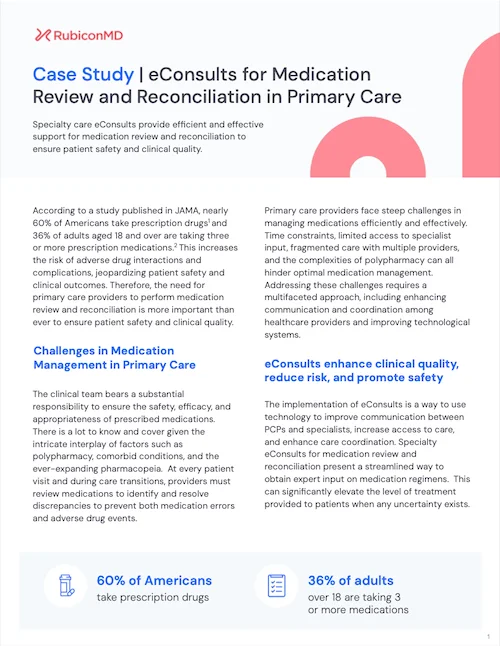eConsult Transcript
PCP submission
33 year old white, gay, cisgender male who presented with history of depression; he is seeking care to address negative, rumantive cycle of thoughts. He began with our virtual practice 8/2021. He comes from a strong Christian background and had marked difficulty during adolescence with his gender identification and sexual orientation. He was in college when he first noticed being depressed. At the time he was seeing a university-based provider who it started him on an unknown antidepressant which he took for three months. At no time had he endorsed suicidal ideation but stopped taking the medication when school ended. Since that time he has not proceeded with further evaluation nor treatment.
In August, he begin to use our virtual service for primary care and subsequently behavioral health counseling with our team psychologist. Of note the patient has not had ability to maintain an erection as far as he can remember back to adolescence. I had ordered a thyroid function, serum testosterone and routine bloodwork for which he has not gotten done yet. His BMI is 35 and when we moved through his informed decision regarding medications for depression he agreed to take bupropion based on his lower incidence of waking and sexual dysfunction. I had started him on 150 mg PO daily there’s some improvement noted. He had side effects soon after increasing to 300 mg daily. He’s self discontinued the medication and when I reached out we again discussed needing medication and we decided to start a citalopram 10 mg per day. Two weeks later, upon follow up, he states he did not start the medication as he was concerned about potential side effects such as weight gain and sexual dysfunction. PHQ-9 at 12 and GAD-7 10.
- I chose NDRI class bupropion SR 150 mg po daily based on his weight and concern for sexual dysfunction. When increased to 300 mg, he experienced nausea, feeling dizzy and lightheaded. How should I approach dosing adjustments?
- I explained that escitalopram has limited side effects but is an SSRI and each patient may have an individual response. I let him know this is an isomeric form of citalopram and should have minimal side effects, but he has not yet started this. How can I counsel him?
PCP submission
Hi. Thank you for sharing your consult. This is a challenging situation. You might find this algorithm helpful: https://psychopharm.mobi/algo_live/
Chronic anxiety and/or depression and/or conflict about sexuality can result in sexual dysfunction. Antidepressants might alleviate the sexual dysfunction if that’s the case. Undiagnosed and untreated OSA accounts for persistent depression symptoms despite antidepressant treatment, lack of energy, lack of motivation, and mood swings. You might assess for it. Please see this review of OSA in Psychiatric disorders: https://ajp.psychiatryonline.org/doi/pdf/10.1176/appi.ajp-rj.2018.130502
Does he use alcohol, smoke marijuana, and/or use illicit drugs? If so, how much and how often? For what reason(s)? Using substances might exacerbate his symptoms. Does this person have a trauma history? You might provide him the PTSD Checklist 5 to complete: https://www.ptsd.va.gov/professional/assessment/documents/PCL5_Standard_form.PDF
This assesses somatic dissociation: https://emdrtherapyvolusia.com/wp-content/uploads/2016/12/SDQ-20.pdf
The below website is a great resource about trauma and dissociation. The dissociative experiences scale II explores various dissociative phenomena. http://traumadissociation.com/des
This is another great resource: https://www.isst-d.org/
Here is a handout on Borderline Personality Disorder: https://www.borderlinepersonalitydisorder.org/wp-content/uploads/2011/07/A_BPD_Brief_REV2011.pdf
Here is an article that describes Primary Care screening of eating disorders: https://www.ncbi.nlm.nih.gov/pmc/articles/PMC1494802/
You can ask the following questions:
• Are you satisfied with your eating patterns? (A “no” to this question was classified as an abnormal response).
• Do you ever eat in secret? (A “yes” to this and all other questions was classified as an abnormal response).
• Does your weight affect the way you feel about yourself?
• Have any members of your family suffered with an eating disorder?
• Do you currently suffer with or have you ever suffered in the past with an eating disorder? If abnormal responses, I would recommend referring to an eating disorder specialist, if possible.
The SCOFF questionnaire is also used to screen. http://www.cedd.org.au/hne/other/scoff_questionnaire.pdf
- Do you ever make yourself sick (vomit) because you feel uncomfortably full? 2. Do you worry you have lost control over how much you eat? 3. Have you recently lost more than one stone (approx 6 Kg) in a three month period? 4. Do you believe yourself to be fat when others say you are too thin? 5. Would you say that food dominates your life? Each positive response (yes) is given 1 point. A score of 2 or more indicates a possible eating disorder and warrants further exploration. Fluoxetine is considered a weight neutral SSRI. That would be the recommendation for him.
Alternatively, psychotherapy with a CBT therapist is an option. Moderate exercise 3-5 days weekly for 30 minutes is an effective antidepressant. It’s also important for him to structure his days with meaningful and social activities. This is Behavioral Activation, another evidence-based treatment for depression symptoms. The Depression and Bipolar Support Alliance offers free support groups to people: https://www.dbsalliance.org/
Free apps that might help: Headspace MindShift CBT Unwinding Anxiety Breathe2Relax Please feel free to contact me with additional questions!>
